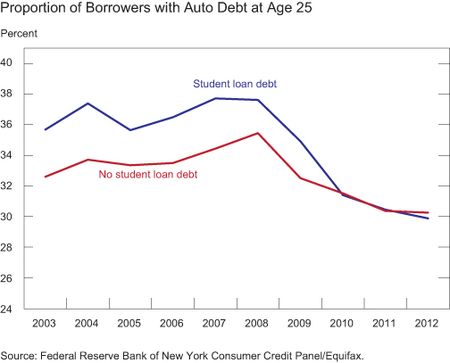The Federal Reserve Bank of New York is out this morning with new research (“Young Student Loan Borrowers Retreat from Housing and Auto Markets”) showing that student debt is not merely painful to those owing it, but has also become economically damaging.
The debt burden is essentially neutralizing, or worse, the income advantage of having earned a bachelor’s degree or more, at least as measured by the ability to buy a house or a car.
Over the last decade, the share of 25-year-olds with student debt has risen from about 25% in 2003 to 43% in 2012, and their average debt burden has nearly doubled, from $10,649 in 2003 to $20,326 in 2012.
At first this seemed to have few economic consequences; from 2003 to 2009, the homeownership rate of people with student debt was significantly higher than that of those without student debt—which isn’t surprising, given the income premium still enjoyed by those with education after high school. That changed during the Great Recession, as homeownership rates fell across the board.
But those for student debtors fell harder than others, and as of 2012, the homeownership rate of those with student debt was lower than those without.
Something similar is true of car ownership: a higher proportion of those with student debt have historically borrowed to buy new or late-model used cars than those without student debt. That changed during the recession too. Now the rates are about the same.
It looks like student debt is replacing other kinds. Despite the rise in the student debt burden, the overall indebtedness of those still paying for their degrees has declined, meaning that they’ve pulled back markedly from more traditional forms of borrowing.
This is, the New York Fed researchers conclude, probably the result of joint decisions by both borrowers and lenders.
Student debtors have probably concluded that their future earning prospects are pretty crummy, and that paying down their loans will claim a painfully large chunk of their income. Why add to the problem by borrowing more to buy a house or a car? And lenders are no doubt spooked by all that lingering education debt (especially given high and rising delinquency rates).
Credit scores of those with and without student debt were once pretty similar, but they diverged around 2008.
As of last year, the average Equifax credit score for a 30-year-old with student debt was 24 points below the average for those without student debt; for 25-year-olds, the difference was 15 points. And that’s despite the theoretically greater earnings potential for the degreed.
Car sales have recovered since the recession lows, but they remain well below their long-term trend. And the recovery from the housing bust has been very weak. Weakness in both these markets, especially housing, has been a major drag since the economy officially bottomed out in 2009.
It’s nice to imagine an economy where the purchase of cars and houses using gobs of borrowed money would be less central to material well-being, but we’re a long way from that. It looks like student debt, aside from being a miserable burden on those paying it, is harming the broad economy, and will continue to for years to come.
This article originally appeared in the Left Business Observer.
Doug Henwood is the legendary editor of The Left Business Observer. Follow him @DougHenwood and @WashSpec.




0 Comments